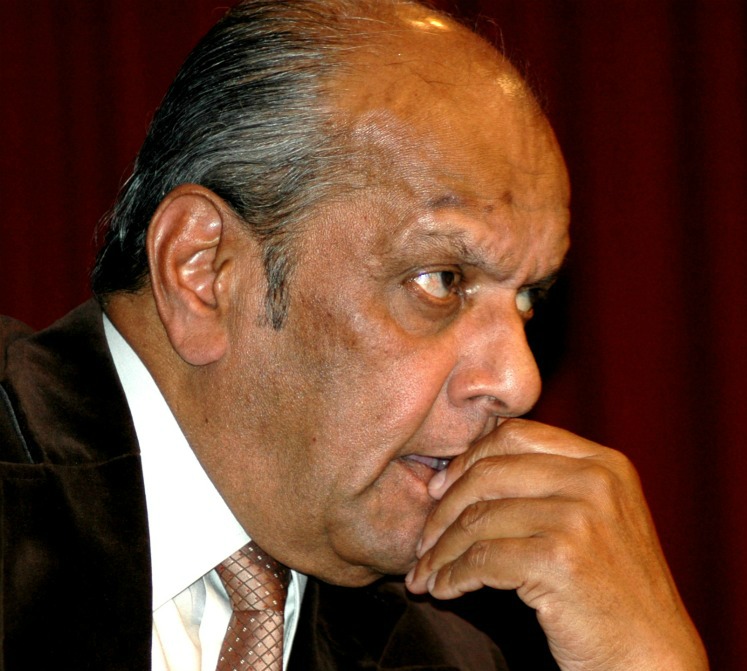Working with Muhammad Ali, the boxing champ
Category:

Reginald was born in Lahore before Partition. He writes books on various subjects pertaining to South Asia. A former London journalist, he now lives in Mid Wales with his actor wife Jamila. His latest book is Shaheed Bhagat Singh and the Forgotten Indian Martyrs, Abhinav Publications, New Delhi. A member of the Society of Authors, he is a Fellow of the Royal Society of Arts.
In the mid-1970s, I was chairman of a small film and TV production company, Seven Stars Limited, which had offices in Piccadilly, London.
There were three directors: Omer Ahmed, a businessman from Calcutta, Marc Alexander, a prolific author from New Zealand, and I. We had a businessman friend in Dhaka named Ghiasuddin Chowdhury.
Ghiasuddin told us that Bangladesh wanted to be put on the world map. It had been devastated and needed foreign aid.
Muhammad Ali was a great boxing hero at that time. His stand against the American involvement in the Vietnam War had won him many admirers all over the world. We thought: who better than Ali to front a film on Bangladesh?
Omer Ahmed and I made many trips to the US and eventually persuaded Ali that it was his duty to help this new country.
In the meantime, Ali had just been beaten by Leon Spinks. (Ed. note: see the fight here). Ali was very downhearted. We told him that he was still a hero in Bangladesh.
We persuaded Bangladesh's President Zia-ur-Rehman to invite Ali, his wife and his entourage to visit Bangladesh. While there, we filmed his tour and made him speak to camera. (Ed. note: This film and a discussion are available here).

Ali had charisma and was a pleasure to work with. I scripted the film but he had a tendency to add his own dialogue, which gave the film a rare Ali quality and originality. Hence, it was greatly appreciated.
President Zia made him a Citizen of Bangladesh. I even took him to the main temple in Dhaka.
Later, in early 1980, we repeated the successful formula in India. Our partner in India was Lord Swraj Paul, the steel magnate, who was a close friend of Indira Gandhi. The plan to make India I Love You was carefully worked out. In India, Ali's reception was even more rapturous. He was given a royal reception. We took him to the Taj Mahal, and we filmed Ali and his wife, Veronica, there.
He was one of the President of India's special guests at the Republic Day Parade on January 26.
He cracked jokes with Mrs Gandhi and kissing her lightly on the cheek said: "America kisses Mother India!" Both her sons, Rajiv and Sanjay, regarded him as a super-hero.

In New Delhi's packed National Stadium, Muhammad Ali greeted his cheering fans.

We went to Madras (Chennai) as part of Ali's tour of India.
While we were in Madras, Ali got a phone call from US President Jimmy Carter.
In order to avoid journalists and gossip writers pestering Ali, I told the Connemara Hotel that all calls to Ali or his entourage had to be first channelled through me. As the Producer, I had to protect Ali's privacy.
One day, the phone rang in my hotel room. The hotel's receptionist said: "Sir, there is a call from the White House. The President of the United States wants to speak to Mr Muhammad Ali."
Being an investigative journalist myself, I smelt a rat. I thought someone was pulling a fast one to get to Ali.
So, I said the receptionist: "Tell him that I am the Producer of the film and he must talk to me first."
She connected me. A voice (in a strong Southern accent) said: "I am Jimmy Carter. Please let me speak to Ali immediately."
I replied: "Why? I have him under contract to me."
The caller said, "The US ambassador in Delhi knows about my call. He will ring you in five minutes."
I could not believe my ears. I was now convinced that this was a genuine call.
I said: "Mr President, please hold on. I'll go to Ali's suite and connect you to him."
Ali was resting in his suite. I barged in and said, "Brother, your President wants to talk to you."
Ali picked up the phone. When he heard Carter's voice, Ali stood to attention.
All I heard was: "Yes, Mr President. Yes, Mr President."
Ali put down the phone. What he said to me next shattered me.
"Brother Reg, My President has ordered me to immediately fly to Africa and Saudi Arabia. My orders are to tell them all to boycott the Moscow Olympics because the Russians have invaded Afghanistan, a Muslim country."
My film about Ali and India had just sunk. The best laid plans of mice and men often collapse like a house of cards.
Within three hours, an American jetliner had flown into Madras. And Ali and his entourage flew out immediately to Riyadh. As President Carter's personal ambassador, he was welcomed on the tarmac by the Saudi King.
Today, it makes me very sad when I see pictures of 'The Greatest', as Ali was known, in poor condition. One can only pray for him.
How the mighty are often laid low. .
© Reginald Massey 2014
Add new comment